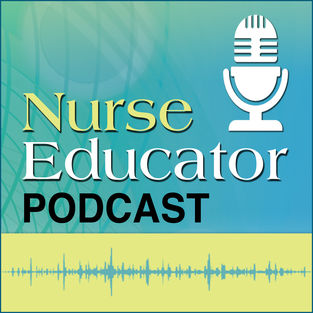
Nurse Educator Tips for Teaching
Nurse Educator
Whether you are a beginning or an experienced nurse educator, you will get new ideas for your teaching in this podcast. Experts share teaching strategies you can use with your nursing students.
- 24 minutes 59 secondsRelationship Between Professional Quality of Life, Grit, and Compassionate Teaching in RN to BS Nursing Students
Research indicates that compassionate teaching (CT) positively correlates with professional quality of life among RN to BSN students and can enhance student resilience and well-being. Faculty who integrate CT into the learning environment help students prepare for practice in stressful healthcare settings. In this podcast and article, Dr. Lisa Ruth-Sahd discusses the outcomes of a mixed-methods research study that nursing faculty can use when teaching RN-to-BSN students. Trauma-informed teaching is emphasized.
5 February 2026, 12:17 am - 23 minutes 36 secondsInteractive 360-Degree Videos for Nursing Education
In today's technology-driven world, nurse educators face the challenge of creating engaging learning experiences. Using 360-degree camera technology, interactive videos were developed with academic, hospital, health department, and rehabilitation partners. In this podcast and article, Drs. Sue Owens, Lenna Westerkamp, Pam Smyth, and Shannon Love discuss this initiative and the impact of this technological approach on student learning.
5 February 2026, 12:16 am - 18 minutes 18 secondsDeveloping Course-Specific Clinical Evaluation Tools to Assess CompetenciesDr. Rebecca Davis describes the clinical evaluation tool that faculty developed to assess clinical competencies based on the AACN Essentials. The tool is structured as a developmental rubric, allowing documentation of each learner's progress toward independence in clinical practice. Faculty identified challenges, however, when assessing competency with a one-size-fits-all clinical evaluation tool, particularly in specialty courses with unique populations and limited clinical practice. This led to the development of course-specific clinical evaluation tools. Learn more about these tools in her article, where she also shares examples of tools with readers.4 February 2026, 11:13 pm
- 17 minutes 53 secondsEntry and Exit Tickets
First-semester nursing students often struggle to connect health assessment and skills lab content with clinical expectations. To bridge this gap, Dr. Pendergraft-Horne and Cory Smith implemented structured entry and exit tickets in labs, guided by the Transparency in Learning and Teaching framework and Bloom's higher-order thinking skills. These tools fostered accountability, clinical application, and inclusive practice. In this podcast and article, they describe this innovative strategy.
4 February 2026, 8:14 pm - 19 minutes 50 secondsMixed Reality Approach to IV Simulation With Bimanual Haptic Feedback
Peripheral intravenous catheter (PIVC) insertion is an essential skill for nurses. Students, however, face challenges in learning PIVC insertion due in part to limited opportunities for hands-on practice with real patients. Traditional training methods with low-fidelity task trainers lack variability and depend on costly consumable products. To address this gap, Dr. Jeremy Jarzembak and his team developed a bimanual haptic feedback mixed reality IV simulator. This technology simulates IV needle insertion under diverse conditions. Their article explains the development of this new technology and reports findings on students' improved confidence and success rate.
21 January 2026, 9:31 pm - 16 minutes 54 secondsEngaging Students in Defensive Documentation
Nursing students need to develop strong documentation skills. In this podcast and article, Lacy Hester describes an interactive classroom activity she developed that immerses students in a realistic legal scenario where they need to defend their own clinical documentation. Using de-identified notes from students' previous simulations, skills labs, and patient care assignments, students critically review the notes and rewrite entries using correct terminology and format. Students learn to justify their documentation choices and consider the legal implications of their wording.
21 January 2026, 9:30 pm - 14 minutes 31 secondsLess Reading, More Learning: Boosting Engagement by Scaling Back Homework
Generation Z health professions students often struggle to stay engaged with large volumes of assigned readings, especially when the reading involves dense academic texts or unfamiliar vocabulary. Rather than relying solely on independent, out-of-class reading, consider incorporating guided in-class readings as an active learning strategy. Break readings into manageable segments and structure your class to alternate between brief reading periods (5-10 minutes) and guided discussion. This approach helps students process material in real time. Learn more about this classroom strategy from Dr. Kristopher Jackson in this podcast and teaching tip.
21 January 2026, 9:23 pm - 18 minutes 56 secondsAlumni as Guest Instructors in Open Lab
Nursing faculty teaching in a prelicensure nursing program implemented a unique way to engage alumni by hosting them as guest instructors during Open Lab experiences. Karen Schofield, Christelle Isaac, and Dr. Bryce Catarelli discuss challenges and benefits to implementing this innovative concept. Additional information can be found in their article.
21 January 2026, 6:50 pm - 19 minutes 39 secondsNP Residency Days as a Transition-to-Practice Clinical Teaching Strategy
Nurse Practitioner Residency Days addresses the disconnect between classroom education and real practice. Implementing NP Residency Days into practicum courses gives students real-word clinical challenges and scenarios reflecting the role of the first-year NP. Dr. Emily Lee describes NP Residency Days in this podcast. Read more in her article in Nurse Educator.
7 January 2026, 7:21 pm - 17 minutes 28 secondsFrom Boomer to Zoomer: Bridging Generational Divides in Nursing Education
Nurse educators interact with multiple generations of learners and colleagues. Each generation is unique, which can create divides. In this podcast and article, Dr. Jennifer Chicca shares strategies educators can use to bridge these generational divides.
7 January 2026, 7:20 pm - 13 minutes 25 secondsMedia Competency Training Program for Doctoral Nursing Students
Despite playing an important role in patient care and advocacy, nurses are consistently underrepresented and quoted in health care media coverage. To address this, Dr. Rachel Malloy developed a media training program for doctoral students based on the 10 published media competencies for nurses. In this podcast and article, she explains why media training for nurses is important, describes the training program, and reports on the outcomes of the program.
7 January 2026, 4:32 pm - More Episodes? Get the App